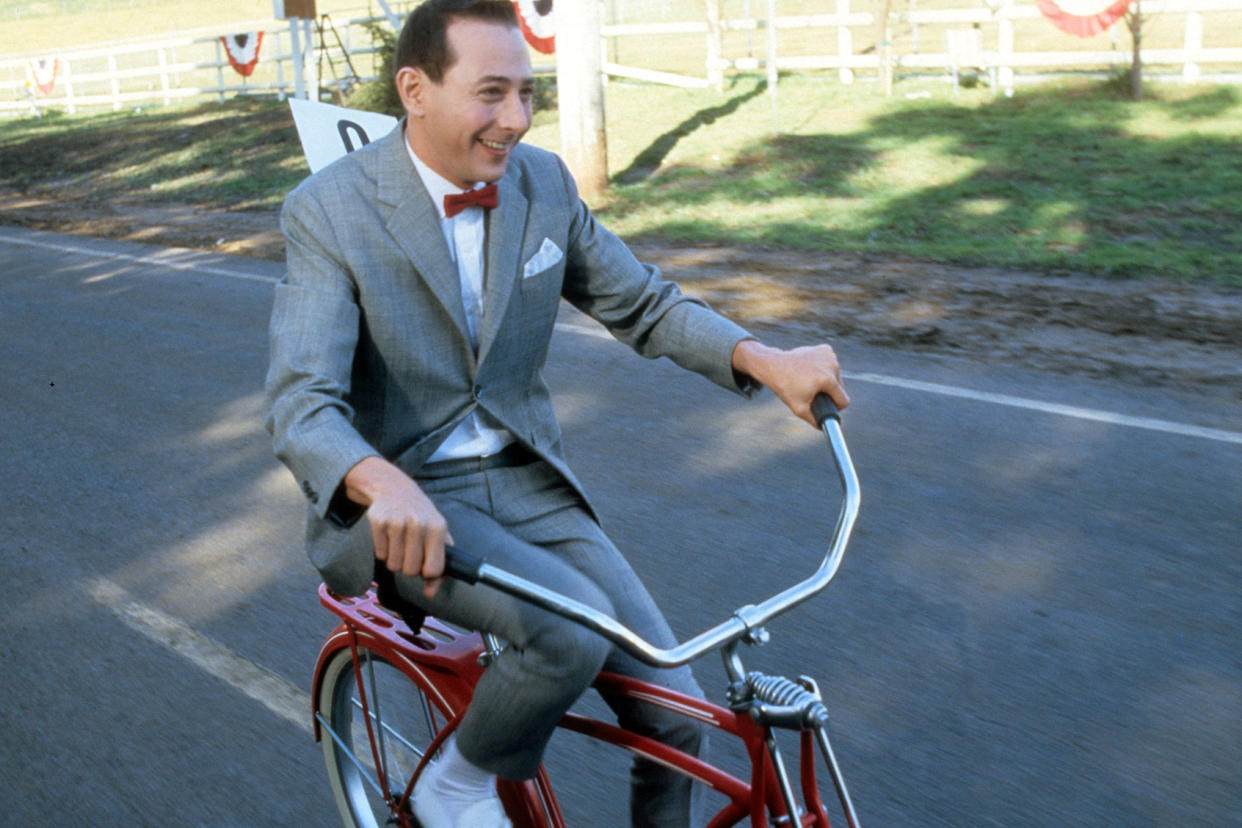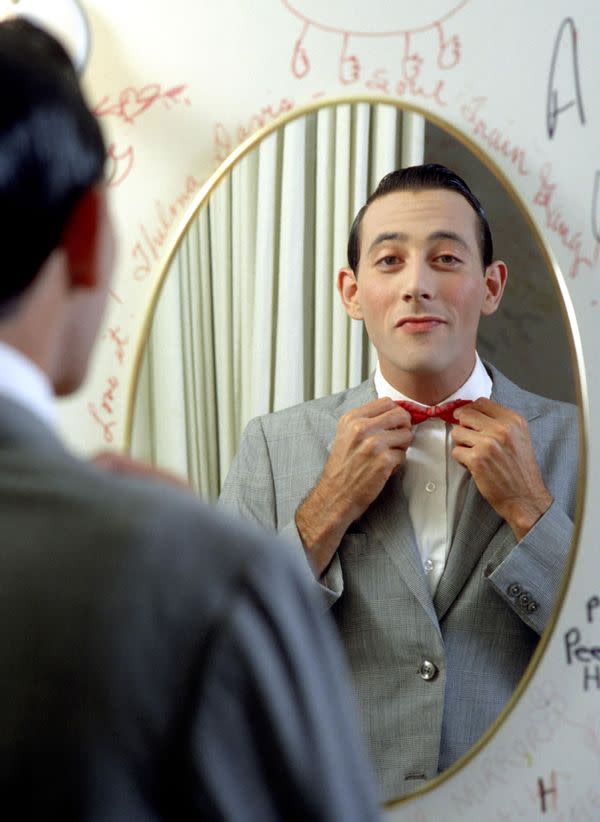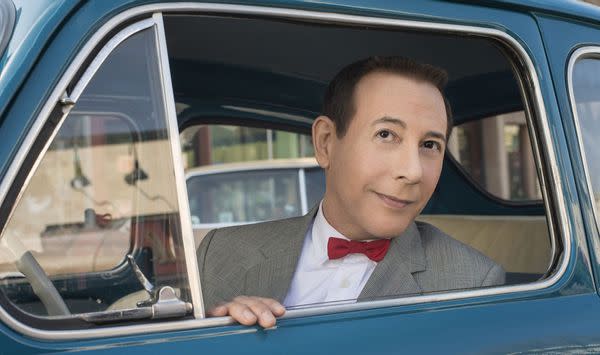Through Pee-wee Herman, Paul Reubens reminded Gen X to stay true to our immature inner children

- Oops!Something went wrong.Please try again later.
Our culture's inability to contend with mortality places artists like Paul Reubens in a domain that was uniquely his, where he maintained the illusion that benevolent childishness defies aging.
This is the eternal gift Reubens leaves us through signature character Pee-wee Herman, cemented in the Generation X Hall of Fame by the CBS children's show "Pee-wee's Playhouse," which ran from 1986 through 1990.
That may inform why the actor chose to keep his six-year cancer battle to himself. People like Reubens, who died Sunday at the age of 70, aren't merely aware of their image. They assume the heavy responsibility for what they mean to us.
"Please accept my apology for not going public with what I've been facing the last six years," Reubens said in a statement posted Monday on his Instagram account along with his death announcement. "I have always felt a huge amount of love and respect from my friends, fans and supporters. I have loved you all so much and enjoyed making art for you."
That art encouraged people to remain connected to the part of us that stays pure, a little puerile and always kind. Pee-wee looks ageless and behaves as if maturity never occurred to him, allowing Reubens to sustain the character over four decades in movies and on TV. The 2016 Netflix movie "Pee-wee's Big Holiday" represents his final onscreen outing as "the luckiest boy in the world."
That was pleasant, but could never top his big-screen debut in Tim Burton's 1985 now-classic "Pee-wee's Big Adventure" with its hero's quest to recover his stolen and highly customized Schwinn Western Flyer. For a time the movie's best quotable moments were inescapable, mainly on playgrounds.
But "Pee-wee's Big Adventure" performed other services too, like revealing the Alamo doesn't have a basement and that a sufficiently hilarious dance to The Champs' 1958 hit "Tequila" can disarm an angry motorcycle gang.
Above all, Reubens' worldwide introduction to Pee-wee earned the lifelong affection of millions thanks to the hero's wit, sweetness and arch juvenility.
"I always viewed Pee-Wee Herman as somebody with a really good heart, but like, you know didn't have a clue about a lot of things," Reubens told NBC reporter Stone Phillips in a 2004 interview. "Somebody who was truly naive and was trying to do the best he could do, but it didn't always come out like that."
Indeed. In Pee-wee, Reubens created a timeless, ageless friend you can't help but love — asexual, bawdy and queer in one package, whose tastes are both cutting edge and retro vaudevillian. That was true of Pee-wee when we first visited his Puppetland house in the 1980s as it was almost 25 years later when Reubens revived him for a Funny or Die sketch skewering the iPad.
Reubens was born Paul Rubenfeld on August 27, 1952, in Peekskill, N.Y., but grew up in Sarasota, Fla. After high school he spent a year at Boston University before transferring to the California Institute of Arts at Valencia in 1971.
He soon shortened his surname to Reubens and made many efforts to score his big break. One of the earliest is an appearance on "The Gong Show" with his Groundlings collaborator John Paragon featuring a very early performance of that famous dance. (Paragon, who died in 2021, went on to play Jambi the Genie in "Pee-wee's Playhouse.")
"Pee-wee's Playhouse" was a pastiche of '80s-era UHF tastes, catering to latchkey kids raised on after-school cartoons and reruns of old TV shows and movies while also inviting adults to remember a better version of when, one that never was but could have been much nicer. Its star adopted the whimsical style of children's show hosts like Howdy Doody and the type of brainy humor woven through classic Jay Ward cartoons like "Rocky and Bullwinkle," wrapping himself in a tight gray suit with pants that were too short. Pee-wee's gleaming white shoes heightened the ridiculousness, but his red bow tie completed the look, becoming Reuben's version of a clown's nose.
Clowns are creepy though. Pee-wee should have been but never was, existing in a fantastical house where breakfast is cooked and served using a Rube Goldberg contraption surrounded by a friendly robot, a talking globe, a clock shaped like a map of the United States named Clocky and a talking chair named Chairry.
Honors student mischief-makers may have picked up another message from Pee-wee's getup, which is respectable clothes make it easier to say and get away with nearly anything.
Reubens certainly did that through Pee-wee. He introduced the character in the late 1970s as part of a Groundlings stage performance, but Pee-wee was a creature of TV. Reuben's rejected audition for "Saturday Night Live" inspired him to create "The Pee-wee Herman Show," which debuted at the Groundlings Theater in Los Angeles Los Angeles in 1981 and became an HBO special that same year.
"Pee-wee's Playhouse" arrived on CBS a few years later and merged the live variety show's magical puppet characters into a G-rated format for the Saturday morning cereal crowd. Even so, Reubens managed to slide in plenty of naughty winks with each episode, like one classic scene featuring Laurence Fishburne's Cowboy Curtis. One can't help but appreciate the casual genius of understanding how something can sound different from how it reads or looks, which is why each of Pee-wee's double-entendre lands with feathery innocence, no matter how bawdy and despite the jokester knowing exactly what he's doing.
Fishburne is one of many eventual superstars who passed through the "Playhouse" early in their careers. "Pee-wee's Playhouse" became many people's first introduction to "Law & Order" regular S. Epatha Merkerson, who played Reba the Mail Lady. And it gave "Russian Doll" star Natasha Lyonne her big break as a member of the Playhouse Gang in Season 1, which also featured "Saturday Night Live" legend Phil Hartman as Captain Carl.
"Pee-wee's Playhouse" viewers had no idea who these castmembers would become. What mattered more is that they represented a multiracial world of belonging where, for example, two Black film actors few people had ever heard of, Gilbert Lewis and William Horace Marshall, played the King of Cartoons.
In 1988 the "Pee-wee's Playhouse Christmas Special" took that idea to the next level with surreal cameo parade enlisting appearances by anybody interesting who was anybody at that time. That includes Annette Funicello, Joan Rivers, Dinah Shore, Oprah Winfrey, Magic Johnson, Little Richard, Whoopi Goldberg and . . . Grace Jones? Yes, her too.
Few people can muster a gathering like that in the same place as the Del Rubio Triplets, Charo and K.D. Lang. Reubens could, along with enlisting musicians like Mark Mothersbaugh, Danny Elfman, the Residents and Dweezil Zappa to provide the show's soundtrack.
Reubens was beloved on a level that enabled him to recover to an extent from two scandals, the first stemming from a 1991 arrest at an adult movie theater in Sarasota, a year after production ceased on "Pee-wee's Playhouse." In the wake of that arrest, CBS stopped airing the show's reruns.
A second occurred in 2002, when Los Angeles detectives raided Reubens' home and confiscated his collection of vintage erotica, resulting in the city attorney bringing an obscenity charge against him that carried the stain of child pornography accusations. The Los Angeles County district attorney at the time reviewed the same materials and declined to bring felony charges.
"One thing I want to make very, very clear, I don't want anyone for one second to think that I am titillated by images of children," he told NBC in 2004. "It's not me. You can say lots of things about me. And you might. The public may think I'm weird. They may think I'm crazy or anything that anyone wants to think about me. That's all fine. As long as one of the things you're not thinking about me is that I'm a pedophile. Because that's not true."
Both ordeals were heavily covered in the national news and protested by his fans and celebrities. Only the first became something he could joke about, famously opening the 1991 MTV Video Music Awards with this unforgettable one-liner: "Heard any good jokes lately?"

Actor Paul Reubens poses for a portrait dressed as his character Pee-wee Herman in May 1980 in Los Angeles, California. (Michael Ochs Archives/Getty Images)Between then and his second bout of legal troubles, Reubens pulled back on his public appearances for most of the 1990s beyond taking small roles in films such as Burton's 1992 movie "Batman Returns," where he made a cameo as The Penguin's father and a scene-stealing part in 1992's big-screen "Buffy the Vampire Slayer."
He also signed on to "Murphy Brown" for a recurring guest role on "Murphy Brown" which earned him an Emmy nomination in 1995, accelerating a comeback that led to larger parts in the 1999 comedy "Mystery Men" and 2001's "Blow," a swaggering feature about a prolific cocaine dealer. That year he also briefly hosted ABC's adaptation of the PC trivia game series "You Don't Know Jack" — playing a character named Troy Stevens, not himself . . . or Pee-wee.
Following the 2002 arrest, and after his charges were downgraded to a lesser obscenity charge, Reubens took guest roles on an array of TV shows including "30 Rock," "The Blacklist" and "What We Do in the Shadows."
Want a daily wrap-up of all the news and commentary Salon has to offer? Subscribe to our morning newsletter, Crash Course.
Each non-Pee-wee appearance required the audience to recalibrate our expectations and remove Reubens from the glen plaid suits and pomade-slicked hairdo for which we came to know him.

Paul Reubens in "Pee-Wee's Big Holiday" (Netflix)Nevertheless, Reubens never tried to put the character who made him internationally renowned behind him, relaunching "The Pee-wee Herman Show" on Broadway in 2010. Its success resulted in a second HBO special that aired in 2011, earning him another Emmy nomination and reasserting his dedication to glorious oddity, weirdness and humor. But it was probably more important to him that it made the people who grew up with Pee-wee happy to reacquaint themselves with him as adults, if they hadn't already.
"Love you so much, Paul. One in all time," Lyonne tweeted on Monday in response to the news of his passing. "Thank you for my career & your forever friendship all these years & for teaching us what a true original is."
Read more
about Paul Reubens and Pee-wee Herman

